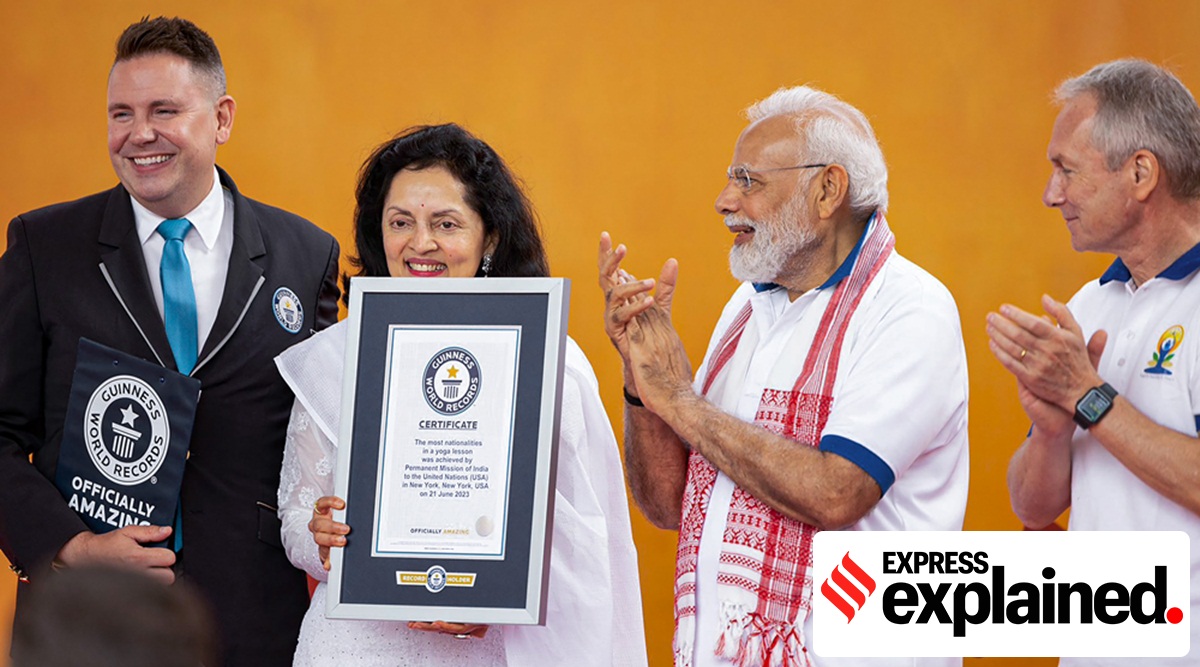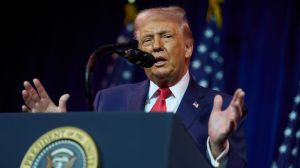PM Modi-led yoga session makes history: What is a Guinness World Record?
Interestingly, the idea behind the Guinness World Records came from an argument Sir Hugh Beaver, managing director of Guinness Breweries, got into, about an obscure fact.
 Prime Minister Narendra Modi applauds as India's Permanent Representative to the UN Ruchira Kamboj shows the Guinness World Records certificate awarded after creating a record for most nationalities in a Yoga session during the 9th International Day of Yoga celebrations at the UN headquarters, in New York, Wednesday, June 21, 2023. The yoga session was led by PM Modi. (PTI Photo)
Prime Minister Narendra Modi applauds as India's Permanent Representative to the UN Ruchira Kamboj shows the Guinness World Records certificate awarded after creating a record for most nationalities in a Yoga session during the 9th International Day of Yoga celebrations at the UN headquarters, in New York, Wednesday, June 21, 2023. The yoga session was led by PM Modi. (PTI Photo) Prime Minister Narendra Modi-led yoga session at United Nations headquarters, on the occasion of 9th International Yoga Day, created a Guinness World Record for participation of people of most nationalities in a yoga event, PTI reported.
Guinness World Records, since its inception in 1955, has become the primary international source for cataloguing and verification of a huge number of world records. It has sold over 150 million books globally in 40 languages.
What are the Guinness World Records?
Guinness World Records – originally known as the Guinness Book of Records – documents record-breaking achievements of all kinds, listing world records both of human achievements and the extremes of the natural world.
The first edition topped the bestseller list in the United Kingdom by Christmas 1955. Today, it contains 62,252 active records. From the “world’s tallest building” (Burj Khalifa, Dubai) to “longest fingernails ever” (Lee Redmond), GWR documents it all.
While originally a yearbook, today, GWR has television shows across the world, as well as a robust online presence, with a huge social media following.
How did Guinness World Records start?
Interestingly, GWR started out as an idea for a book of facts to solve arguments in pubs – arguments which often got messy and violent.
In the 1950s, Sir Hugh Beaver, Managing Director of the Guinness Brewery, attended a hunting party in County Wexford. There, he and his hosts argued about the fastest game bird in Europe and failed to find an answer in any reference book.
Recalling this drunken squabble, Sir Hugh had the idea for a Guinness promotion based on the idea of settling pub arguments. The idea was simple – come up with a book which provides definitive answers for contentious facts. What a boon would this be in resolving drunken disagreements, Sir Hugh felt.
He invited two researchers, twins Norris and Ross McWhirter, to start working on the book. Though they never answered Sir Hugh’s original question about the fastest game bird, they ended up creating a product which would become much more than just a promotion for Guinness.
After the book became a surprise hit, it rapidly expanded and took the form of yearly editions where all records would be updated and new records would be set.
How does one make a Guinness World Record?
While some records are obvious (for example, “world’s tallest man”), others might be less so. As GWR has expanded, so has the number of records and categories it documents.
Today, GWR has over 75 adjudicators across the world, who determine whether a record has been broken or not. There is even an application process – one can apply to invite an adjudicator to witness a record being broken. However, there are some strict criteria that make a Guinness World Record.
A record must satisfy all of the following criteria to count.
- It should be objectively measurable.
- It should be breakable – it cannot be something so unique that only one person can do it.
- Similarly, it should also be standardisable with a possibility to create a set of parameters and conditions that all challengers can follow.
- It should be verifiable.
- It should be based on only one variable.
- It should be the best in the world. For any new record, GWR sets a minimum standard that has to be met for the record to be broken.
In 2022, GWR received 56,000+ record enquiries from 171 countries, with 7,300+ records approved.
What are some criticisms of Guinness World Records?
Since 2008, GWR has orientated its business model toward inventing new world records as publicity stunts for companies and individuals, attracting a lot of criticism.
British-American comedian John Oliver in 2019 lambasted GWR for taking money from authoritarian governments for pointless vanity projects. Others have criticised the organisation for encouraging people to partake in risky activities.
This has led to GWR revisiting some of its policies. According to its latest policy, there are a number of records that are disqualified from the GWR. These include those which cause harm to animals, which endanger the person or spectators, which cause food waste, etc.
- 01
- 02
- 03
- 04
- 05






































